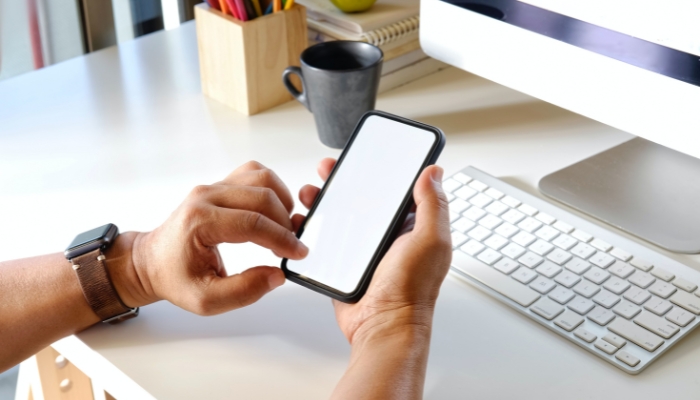
As the old saying goes, ‘knowledge is power’, and in this digital age, a fundamental piece of knowledge is understanding the potential capabilities of your smartphone. You’ve probably heard the term ‘IMEI’ and wondered, is it possible to track iphone with imei? While it’s not a simple yes or no answer, it’s important for you to be aware of the implications, both legal and technological, of IMEI tracking.
Tracking an iPhone using its IMEI number is possible but generally restricted to network providers and law enforcement. Individuals should use Apple’s “Find My” service and report to authorities for tracking lost or stolen iPhones.
By the end of this discussion, we hope you’ll have a clearer picture of what’s possible and what’s not – keeping in mind that sometimes, the answer might surprise you.
Understanding IMEI and Its Functionality
To get a grip on tracking your iPhone with IMEI, let’s first delve into understanding what IMEI is and how it functions.
Standing for International Mobile Equipment Identity, IMEI is a unique 15 to 17 digit IMEI number assigned to every mobile device. It’s like a fingerprint that no two devices share. Your iPhone IMEI number is used by networks to identify valid devices, which may lead you to wonder, ‘Is My IMEI Locked to a Network?
The GSMA IMEI database keeps a record of all valid IMEI numbers globally. When your iPhone is switched on, the network checks against this database. If your iPhone’s IMEI isn’t in the database or is blacklisted, network services won’t be accessible.
The IMEI number is also crucial for the activation lock, a security feature on iPhones. If your iPhone is lost or stolen, you can activate this lock, essentially rendering the device unusable until you unlock it. This feature ties your iPhone IMEI to your Apple ID, making it harder for thieves to use or sell your iPhone.
Understanding these aspects of IMEI will help you leverage this tool for tracking your iPhone.
Legal Implications of IMEI Tracking

Before diving into the mechanics of IMEI tracking, it’s crucial to understand its legal implications. You should be aware that using the digit IMEI number to track an iPhone without the owner’s permission is against the law. It’s seen as an infringement on personal privacy and could lead to serious legal consequences.
However, there are circumstances where IMEI tracking is legal and even necessary. With the help of iPhone Verizon support or Apple support, a lost or stolen iPhone can be traced using its IMEI number. In such a case, a police report is typically required to confirm the phone’s status.
The legal implications of IMEI tracking can be summed up in the following points:
- Tracking someone’s iPhone using their IMEI number without their consent is illegal.
- If your iPhone is lost or stolen, contact iPhone Verizon support or Apple support for assistance.
- A police report is usually necessary to track a lost or stolen iPhone.
- Misusing IMEI tracking technology can lead to severe legal penalties.
- Always respect privacy and use IMEI tracking responsibly and legally.
Always remember, your actions should align with the law.
Technological Limitations and Possibilities
Understanding the technological limitations and possibilities of IMEI tracking is crucial, as it’s not always a surefire way to locate your missing iPhone. Your iPhone’s 15-digit IMEI number, found within your device settings, is a unique identifier that can be used for tracking. However, the effectiveness depends heavily on certain factors.
First, your phone needs to be turned on and connected to a mobile network provider. If your iPhone is turned off or in airplane mode, tracking via IMEI becomes almost impossible. Even if the phone is on, if it’s not connected to a network, the chances of tracking it down diminish significantly.
Second, the cooperation of the mobile network provider is essential. They need to have the infrastructure and willingness to perform the tracking. Not all providers have this capability or are willing to do so due to privacy concerns.
Lastly, location services on your iPhone need to be enabled. If they’re turned off, tracking the device becomes extremely challenging.
You can visit the Apple support community for more information and help regarding IMEI tracking. Remember, while this method has its limitations, it’s still a potential tool in locating your device.
Steps to Track Iphone Using IMEI
Should you need to track your iPhone using its IMEI number, here’s what you’ll need to do.
First, locate your phone’s 15-digit IMEI number. This can be found on the original packaging of the product or in the phone’s security settings.
Next, use a reliable IMEI tracker app. There are several apps available that can track Apple devices using the IMEI number. Download and install one from the App Store.
Use the following steps as a guide:
- Locate your 15-digit IMEI number. It’s usually printed on the original packaging or found in your phone’s security settings.
- Download a reliable IMEI tracker app from the App Store.
- Install the app and enter your IMEI number.
- Ensure your location settings are enabled. This is crucial as the app relies on these to track your device.
- Follow the instructions provided by the app to track your iPhone.
Remember that while IMEI tracking can be a useful tool, it’s not infallible. Always keep your device secure and close to you when possible. Reach out to local law enforcement if you suspect your phone has been stolen.
Effectiveness and Accuracy of IMEI Tracking
How accurate and effective is tracking your iPhone using its IMEI number? The effectiveness and accuracy of IMEI tracking largely depend on various factors. Your 15-digit IMEI number is unique to your device, making it a reliable identifier. However, the accuracy of an iPhone tracker using IMEI depends greatly on the cooperation of your phone service provider.
IMEI tracking can be remarkably effective if your lost device is turned on and connected to a network. This allows the service provider to use the IMEI number to pinpoint the phone’s location. However, if the device is switched off or in airplane mode, the tracking becomes significantly less accurate.
Moreover, effectiveness can be compromised if the device’s IMEI number has been altered or if your service provider refuses to assist. Some countries have strict privacy laws that hinder IMEI tracking.
Alternatives to IMEI Tracking for iPhones

When it comes to locating a lost or stolen iPhone, many people think of IMEI tracking as a primary solution, but this also brings up the privacy concern: Should IMEI Be Kept Private? However, there are alternative methods that can be more effective and accessible. In this section, we’ll explore these alternatives, focusing on Apple’s Find My service, third-party tracking apps, and options provided by network providers.
Using Apple’s Find My Service
Apple’s Find My service plays a vital role in locating iPhones. It’s a built-in feature available on all iOS 10.3 or later-running devices. To use it, you need to have the service activated on your device beforehand.
Once activated, you can track your target phone’s real-time location from another Apple device or via iCloud.com. The service shows an accurate location on maps, making it easier to find your device.
Additionally, you can play a sound on your iPhone, even if it’s in silent mode, lock it remotely with a custom message, or erase its data for personal data security.
Third-Party Tracking Apps
For those who seek more features or do not use Apple’s ecosystem, various third-party tracking apps are available. These apps, like Find360 – Location Tracker or Phone Tracker, offer a range of functionalities. They can provide a detailed location history, precise location tracking, and even location history of the device.
Some apps also offer family sharing features, allowing you to keep track of your entire family’s whereabouts for safety. However, it’s crucial to choose apps that respect your personal data security and have good reviews for reliability.
Network Provider Options
Network operators and cellular network providers sometimes offer services to help locate lost or stolen phones. These services use the phone’s connection to the cellular network to triangulate its position, offering an approximate location.
While not as precise as GPS-based methods, they can still be helpful, especially if the phone is turned off or not connected to the internet. Major providers like T-Mobile Support often have a customer support center that can assist in these situations. However, they might require a formal request or even involve a police station in cases of theft.
In conclusion, while IMEI tracking might seem like a go-to option for finding a lost iPhone, Apple’s Find My service, third-party apps, and network provider tools offer practical and often more accessible alternatives. Each method has its strengths and can be chosen based on your specific needs and circumstances.
Remember, the best defense is always to take preventive measures like setting a complicated password and keeping your device passcode secure to avoid losing your phone in the first place.
Preventive Measures to Secure iPhones
Securing your iPhone is crucial in today’s digital age, where the risk of loss or theft is ever-present. By taking proactive steps, you can safeguard your device and the valuable information it holds.
This section will cover the essentials of setting up Find My iPhone, best practices for iPhone security, and actions to take if your iPhone is lost or stolen.
Setting up Find My iPhone
Find My iPhone is a powerful tool provided by Apple that helps in locating and protecting your device in case it goes missing. To set it up, go to your iPhone’s Settings, tap on your Apple ID, and then select ‘Find My’. Ensure that ‘Find My iPhone’ is turned on.
This feature not only tracks your device’s real-time location but also allows you to play a sound, display a custom message on the lock screen, or remotely erase your iPhone to protect your data. For added security, enable ‘Send Last Location’, which sends the device’s location to Apple when the battery is critically low.
Best Practices for iPhone Security
Maintaining robust security practices is key to protecting your iPhone. First, always use a complicated password or Touch ID/Face ID to lock your device. This prevents unauthorized access and secures your personal data. Regularly back up your iPhone to iCloud or your computer to safeguard your data.
Be cautious about the apps you download and the permissions you grant them. Keep your iOS and apps updated to ensure you have the latest security patches. Additionally, avoid connecting to unsecured Wi-Fi networks and consider using a VPN for enhanced privacy.
What to Do If Your iPhone Is Lost or Stolen
If your iPhone is lost or stolen, act quickly. First, use another device to access the Find My app or iCloud.com and put your iPhone in Lost Mode. This locks your device with a passcode and can display a customized message with a contact number on the lock screen. If you believe your iPhone is stolen, report it to the local police station and provide them with your iPhone’s 15-digit serial code IMEI number.
Contact your network operator to disable your account to prevent unauthorized use. Lastly, if you’re unable to recover your iPhone and are concerned about data security, you can remotely erase your device through Find My iPhone.
By following these preventive measures, you can significantly enhance the security of your iPhone. Remember, the key to effective iPhone security lies in being proactive and vigilant.
Future of iPhone Tracking Technologies

The landscape of smartphone tracking and security is rapidly evolving, with emerging technologies promising more sophisticated methods of keeping devices safe. In this context, Apple, known for its commitment to innovation and security, is likely to play a pivotal role in shaping the future of iPhone tracking technologies.
Emerging Technologies in Smartphone Tracking
The future of smartphone tracking is gearing towards more advanced and integrated technologies. One such area is the use of AI and machine learning to predict and detect unusual patterns that might indicate a lost or stolen phone.
Additionally, advancements in geofencing technology could allow for more precise location alerts, enhancing the real-time location tracking capabilities.
Another exciting development is the integration of augmented reality (AR), which could enable users to locate their devices in a more interactive and intuitive way by overlaying the device’s real-time location onto a live camera feed.
Apple’s Innovations in Security
Apple continues to be at the forefront of security innovations. With each iOS update, we can expect enhanced encryption methods, making iPhones even more secure against unauthorized access.
Apple might also integrate more sophisticated biometric technologies, such as advanced facial recognition or retina scanning, offering a more secure and personalized way to access the device.
Furthermore, Apple’s focus on personal data security suggests that future tracking technologies will be designed with user privacy as a top priority.
Predictions for Future Tracking Methods
Looking ahead, tracking methods are expected to become more proactive and user-friendly. We might see the introduction of predictive tracking, where your iPhone can alert you before you leave it behind. The concept of network-based tracking could also evolve, utilizing a huge network of connected devices to locate a phone even when it’s offline.
Additionally, as 5G technology becomes more widespread, the speed and accuracy of location tracking are likely to improve significantly.
The future of iPhone tracking technologies is poised to offer more robust, accurate, and user-centric solutions. As these technologies develop, they will not only make it easier to recover lost or stolen devices but also significantly enhance the overall security and user experience of iPhones.
Conclusion
So, is it possible to track iphone with imei? Technically, yes. But it’s not as straightforward as you’d think. Legal issues and technological limitations come into play. Also, accuracy isn’t guaranteed.
If you’re ever in a position to track a lost or stolen iPhone, it’d be best to use Find My iPhone or report it to the police. Relying solely on IMEI tracking may not be the most effective method.
FAQs: Is It Possible to Track Iphone With IMEI
Can I track my iPhone if I haven’t set up Find My iPhone?
Unfortunately, if you haven’t set up Find My iPhone before your device went missing, tracking it becomes significantly more challenging. Apple’s Find My service is the primary tool for locating lost or stolen iPhones. Without it, you’re reliant on other methods, such as checking your location history in maps or using a third-party tracking app if you had one installed.
Is it possible to track an iPhone when it’s turned off or offline?
With recent updates, Apple has introduced a feature that allows you to locate your iPhone even when it’s offline or powered off. This is possible through the Find My network, a huge network of Apple devices that can detect the Bluetooth signal of a lost device and relay its location back to the owner. However, this requires that the feature was enabled before the phone went offline.
How can I prevent someone from tracking my iPhone?
To prevent unauthorized tracking of your iPhone, ensure that you have strong security settings. Use a complicated password and enable Touch ID or Face ID. Regularly review the app permissions, especially those with access to your location data. Also, be cautious about sharing your iCloud credentials, as they can be used to access your Find My iPhone settings.
Can the police track my iPhone for me?
If your iPhone is stolen, the police can assist in tracking it, but they typically require a formal report and your iPhone’s 15-digit serial code IMEI number. While they may not actively track the device’s location, they can use the information provided to aid in its recovery, especially if it turns up during investigations.